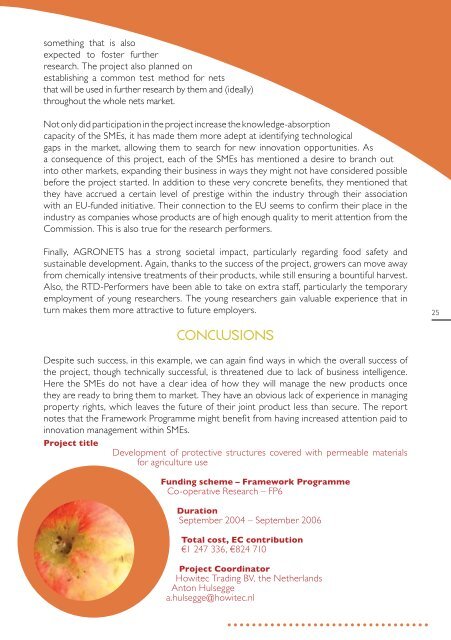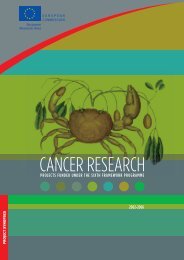SMEs and Research - European Commission - Europa
SMEs and Research - European Commission - Europa
SMEs and Research - European Commission - Europa
Create successful ePaper yourself
Turn your PDF publications into a flip-book with our unique Google optimized e-Paper software.
something that is also<br />
expected to foster further<br />
research. The project also planned on<br />
establishing a common test method for nets<br />
that will be used in further research by them <strong>and</strong> (ideally)<br />
throughout the whole nets market.<br />
Not only did participation in the project increase the knowledge-absorption<br />
capacity of the <strong>SMEs</strong>, it has made them more adept at identifying technological<br />
gaps in the market, allowing them to search for new innovation opportunities. As<br />
a consequence of this project, each of the <strong>SMEs</strong> has mentioned a desire to branch out<br />
into other markets, exp<strong>and</strong>ing their business in ways they might not have considered possible<br />
before the project started. In addition to these very concrete benefits, they mentioned that<br />
they have accrued a certain level of prestige within the industry through their association<br />
with an EU-funded initiative. Their connection to the EU seems to confirm their place in the<br />
industry as companies whose products are of high enough quality to merit attention from the<br />
<strong>Commission</strong>. This is also true for the research performers.<br />
Finally, AGRONETS has a strong societal impact, particularly regarding food safety <strong>and</strong><br />
sustainable development. Again, thanks to the success of the project, growers can move away<br />
from chemically intensive treatments of their products, while still ensuring a bountiful harvest.<br />
Also, the RTD-Performers have been able to take on extra staff, particularly the temporary<br />
employment of young researchers. The young researchers gain valuable experience that in<br />
turn makes them more attractive to future employers.<br />
CONCLUSIONS<br />
Despite such success, in this example, we can again find ways in which the overall success of<br />
the project, though technically successful, is threatened due to lack of business intelligence.<br />
Here the <strong>SMEs</strong> do not have a clear idea of how they will manage the new products once<br />
they are ready to bring them to market. They have an obvious lack of experience in managing<br />
property rights, which leaves the future of their joint product less than secure. The report<br />
notes that the Framework Programme might benefit from having increased attention paid to<br />
innovation management within <strong>SMEs</strong>.<br />
Project title<br />
Development of protective structures covered with permeable materials<br />
for agriculture use<br />
Funding scheme – Framework Programme<br />
Co-operative <strong>Research</strong> – FP6<br />
Duration<br />
September 2004 – September 2006<br />
Total cost, EC contribution<br />
€1 247 336, €824 710<br />
Project Coordinator<br />
Howitec Trading BV, the Netherl<strong>and</strong>s<br />
Anton Hulsegge<br />
a.hulsegge@howitec.nl<br />
25
















